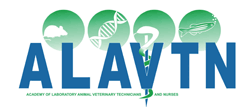Veterinary technicians add laboratory animal specialty
The National Association of Veterinary Technicians in America approved the establishment of the Academy of Laboratory Animal Veterinary Technicians and Nurses this past November. That makes the new group the 14th veterinary technician specialty.
Stephen Cital, executive director of the new specialty and a veterinary anesthetist with expertise in exotic animals, was part of a group of research veterinary technicians who first met in 2010. They went on to create what is now known as the Society of Laboratory Animal Veterinary Technicians, with the intention of creating the veterinary technician specialty for research technicians. The society started the process of petitioning to be recognized in 2014.

He credits the American Association for Laboratory Animal Science with working closely with the society to create a veterinary technician specialty that complements AALAS’ technician certifications and encourages collaboration. With AALAS support, the society also received letters of support from the American Society of Laboratory Animal Practitioners and American College of Laboratory Animal Medicine, Cital said.
The new laboratory animal organization, which operates under the acronym ALAVTN, will develop examinations and certification standards. Over the next few years, it plans to roll out three main categories of specialization. They are as follows:
- Research clinical nursing in traditional, nontraditional, or large animal species.
- Research surgeon.
- Research anesthetist.
Unlike veterinarians, veterinary technicians do not have residency programs to qualify for taking the board examination, but instead, use years of experience, skills lists, and a case log to qualify. Having an inclusive examination similar to veterinary specialties would be limiting for this clinical medicine–based specialty, Cital said.
 “We did this, wanting to be inclusive of all technicians providing medical- or research-based care in the various aspects of the research world. It is also very important that the academy produce veterinary technicians who are dedicated to supporting best clinical practices and are truly advocates not only for the science but are also involved in excellent animal welfare,” he added.
“We did this, wanting to be inclusive of all technicians providing medical- or research-based care in the various aspects of the research world. It is also very important that the academy produce veterinary technicians who are dedicated to supporting best clinical practices and are truly advocates not only for the science but are also involved in excellent animal welfare,” he added.
ALAVTN’s first certification examination is expected to be for research clinical nurses working with traditional laboratory animal species at the 2017 AALAS National Meeting, Oct. 15-19 in Austin, Texas. Application packets are available on the ALAVTN website, and are due April 4.
The other veterinary technician specialties are dentistry, anesthesia/analgesia, internal medicine, emergency and critical care, surgery, equine, zoology, behavior, clinical practice, nutrition, clinical pathology, dermatology, and ophthalmology.